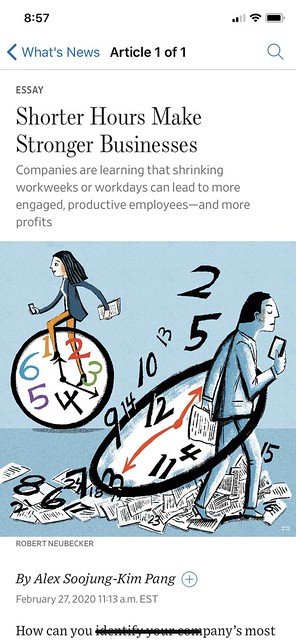Last year during the UK general election, the Labour Party embraced the idea of moving the country to a 4-day week, and Tories did a fabulous job of making it sound like a crazy idea straight out of the Hugo Chavez Institute for Economic Disruption. This despite the fact that there were already lots of places in the UK that had successfully moved to 4-day weeks (like Pursuit Marketing, below).
What a difference 6 months can make. Especially when those six months include a global pandemic, economic lockdown, and conversation around the function and value of work and economies and the future of work.
The idea is still one that’s mainly discussed by politicians who are left of center, like Jacinda Ardern or Nicola Sturgeon, or embraced by people like Andrew Yang who are trying to shake up our thinking; but I just saw that The Spectator has an op-ed by Joe Ryle on “Why Conservatives should support a four-day week.”
It’s an inconvenient truth for campaigners trying to persuade Boris Johnson’s government to explore a four-day working week that the idea was first proposed by Jeremy Corbyn….
But with the general election and Jeremy Corbyn now a distant memory, the Conservative Party should look at the idea in a different light and seriously examine its merits as a way to build up the economy post Covid-19. With an unemployment crisis on the horizon, a four-day week makes a lot of sense and the Conservative Party would be foolish to ignore it.
Ryle argues that despite its sketchy lineage, there are good reasons for the party to appropriate it:
In some respects, a four-day week could be seen as an extension of David Cameron’s ‘Big Society’ – with one of the biggest advantages being better mental health and wellbeing across the board as a result of more time available for socialising, family life and community.
For those Tory MPs in constituencies that are heavily reliant on the tourism industry, there are added benefits as a four-day week would undoubtedly boost tourism across the country because of the extra leisure time people would have available….
[Also] a four-day week is deeply popular – three quarters of UK workers already supported a four-day working week before the Coronavirus pandemic hit and millions of workers have now had a taste of working remotely and on different hours.
There are other small-c conservative arguments you can make in praise of the 4-day week as well.
For one thing, it’s good for business: it makes companies more efficient, productive, and focused. It makes smaller companies more competitive against big firms, improves recruitment and retention, and helps companies be more creative. This was the argument I made in my essay in the Wall Street Journal.
It gives people more time to spend with family and community: despite people declaring their support for the Labour Party with tweets like “Jeremy Corbyn / No surrender / Four day week / Three day bender,” most people actually spend their free time taking better care of themselves, spending more time with family, and doing volunteer work.
JEREMY CORBYN NO SURRENDER
FOUR DAY WEEK AND A THREE DAY BENDER— Marcus Barnett (@marcusbarnett_) December 12, 2019
Finally, in these post-pandemic days, a 4-day week would help companies become more resilient and adaptable, which would mean they could handle crises like a lockdown with less disruption, and come out of them faster.
As Andrew Barnes likes to say, the 4-day week is not a left-wing idea or a right-wing idea; it’s just a good idea. I would love to see a debate across the political spectrum the focused on how to best make it happen, not whether it was possible. That would be a real step forward for everyone.


